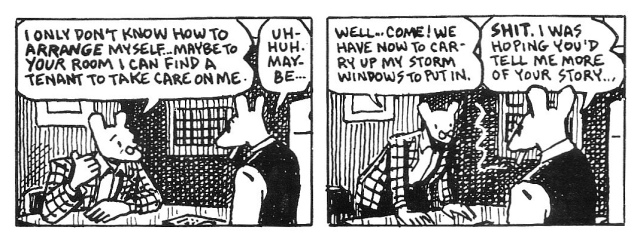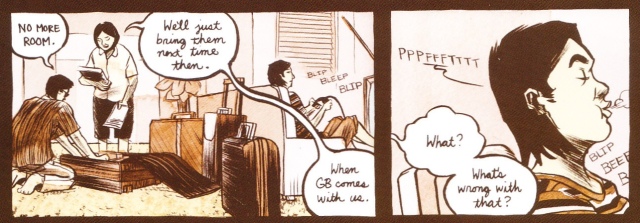I’ve been reflecting on a form of dramatic irony that I see operative in both Art Spiegelman’s Maus and GB Tran’s Vietnamerica. In both cases, the graphic storytellers present themselves within the narratives and show how they came to know their respective parents’ stories. There’s a kind of disjuncture between the mastery and care with which the tragic stories of suffering caused by the Holocaust and the Vietnam War are rendered, and yet both authors/artists choose to present themselves as dismissive or uncaring toward their parents.
In the case of Maus, one such instance arises when his father is sharing his concerns about living alone and needing help with doing a home maintenance chore. In response to the living alone concern Artie (as his father calls him) is mostly disengaged, and in response to the posing of the chore he seems to express irritation:

Something analogous occurs in Vietnamerica when Tran’s parents express to the young GB a desire for him to visit Vietnam and get to know something about the family’s past. The young GB responds dismissively with a “pppffftttt” sound from his mouth, not even turning from playing his video game or offering a dialogue bubble worthy reply:

Moments like these recur in both stories. Spiegelman’s maus-y avatar gets irritated at his father’s cheapness. Tran’s younger self is put out when his father’s graduation gift to him is a book on the Vietnam War. Yet the attitude of both authors/artists in rendering their parents’ stories is one of tenderness and respect, so the disjuncture between what we’re learning about the parents’ stories, including the care with which they are told, and the presentation of the authors as characters learning about those stories seems to be a form of dramatic irony.
Dramatic irony is most often associated with theater, cinema, and sometimes television. For example, in Henrik Ibsen’s A Doll’s House, when Torvald talks about Krogstad’s past crime and how such moral failings in a person in turn pollute their children, he is unaware that Nora (his spouse) hears his words differently because she has committed a similar crime. The disjuncture is between the words of a character (Torvald) and the events that bend the meaning of the character’s words in ways that the character is unaware of (Torvald not realizing that he’s telling Nora that she is corrupting their own children, of which the audience is aware). However, I think the form of dramatic irony operates somewhat differently in graphic stories like Maus and Vietnamerica, where the disjuncture is also between the graphic artists as storytellers and their presentation of themselves as seemingly uncaring toward their parents.
Part of the effect perhaps is one of relatability. In both cases, most readers of Maus and Vietnamerica probably can’t fully comprehend or truly understand the magnitude of either the Holocaust or the Vietnam War, but we probably can relate to being annoyed by or irritated with parents who want us to help with chores or who want us to embrace their priorities, and on a level of scale we can then in turn better understand how such irritations and annoyances are by comparison trivial.
